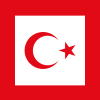İsmet İnönü
İsmet İnönü | |
|---|---|
 | |
| Prime Minister / President of the Republic of Turkey | |
| In office November 11, 1938 – May 14 1950 | |
| Preceded by | Mustafa Kemal Atatürk |
| Succeeded by | Celal Bayar as President, Suat Hayri Ürgüplü as Prime Minister in his last term as Prime Minister. |
| Personal details | |
| Born | September 24, 1884 İzmir |
| Died | December 25, 1973 Ankara |
| Nationality | Turkish |
| Political party | Republican People's Party |
| Spouse | Mevhibe İnönü |
Mustafa İsmet İnönü (September 24 1884 - December 25, 1973) was a Turkish soldier, statesman and the second President of Turkey.
He was born in İzmir in 1884. His father was Hacı Reşid Bey, a member of the Ottoman bureaucracy, an examining magistrate born in Malatya, and his mother was Cevriye Hanım, daughter of Russo-Turkish War refugees from Bulgaria. Due to his father's assignments, the family moved from one city to another. Thus, İsmet İnönü did his primary studies in Sivas.
İnönü graduated from the Military Academy in 1903 and received his first military assignment in the Ottoman army. He joined the Committee of Union and Progress. He won his first military victories by suppressing two major revolts against the struggling Ottoman Empire, first in Rumelia and second in Yemen whose leader was Yahya Muhammad Hamid ed-Din. He was also the military officer on the preparation of the new frontier between Ottoman Empire and Bulgaria after Balkan Wars. During World War I, he fought on the eastern front in Syria, then he was appointed as the commander of the western fronts. During his assignment in the Caucasus he worked with Atatürk. After World War I he passed the Anatolia to join the Turkish nationalist movement. After the default of Ali Fuat Cebesoy to organize the local Turkish rebellious troops, he became the general commander of the western Turkish army and remained in this position during War of Independence. He was promoted to brigadier general after the "Battles of İnönü", in which he successfully defended the central Anatolian territory against the Greek Army. During War of Independence he was also member of the Grand National Assembly.
He made a career change by being chosen as the chief of the Turkish delegation in the Treaty of Lausanne. İnönü had been Prime Minister of Turkey for several terms, maintaining the system Atatürk had put in place. He acted after every crisis (such as the civil disorder of Sheikh Said or attempted assassination of Atatürk in Izmir) to restore peace in the country. He managed the successful economic launch, especially after the 1929 economic crisis, by planning with the help of the Soviet Union.
After the death of Atatürk, he was the only candidate to succeed him, and he was elected as the second President of the Republic of Turkey. His biggest political achievement was keeping Turkey out of World War II. In 1950 his party lost the general election and presided over the peaceful transfer of power to the Democratic Party. İnönü served for ten years as leader of the opposition before returning to power after the coup of 1960.

Ismet Inönü was by the standards of his time a highly educated man, speaking Arabic, German, French and English.
İnönü died in 1973. He was interred opposite Atatürk's mausoleum at Anıtkabir in Ankara.
His son, Erdal İnönü, is a former leader of the Social Democracy Party, Social Democratic Populist Party; former deputy prime minister of Turkey, and also the honorary leader of Social Democratic People's Party.


